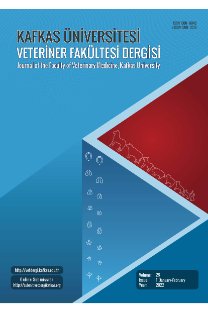Th1/Th2 Cytokine Balance and SOCS3 Levels of Female Offspring Born from Rats with Gestational Diabetes Mellitus [1]
Gebelikte Diabetes Mellitus Şekillenmiş Ratlardan Doğan Dişi Yavrularda Th1/Th2 Sitokin Dengesi Ve SOCS3 Düzeyleri
___
- Eriksson UJ: Congenital anomalies in diabetic pregnancy. Semin Fetal Neonatal Med, 14, 85-93, 2009. DOI: 10.1016/j.siny.2008.11.001
- Yessoufou A, Moutairou K: Maternal diabetes in pregnancy: Early and long-term outcomes on the offspring and the concept of "Metabolic Memory". Experimen Diab Res, Article ID 218598, 2011. DOI: 10.1155/ /218598
- Belardelli F: Role of Interferons and other cytokines in the regulation of the immune response. APMIS, 103, 161-179, 1995. DOI: 10.1111/j.1699- 1995.tb01092.x
- Raghupathy R: Th1-type immunity is incompatible with successful pregnancy. Immunol Today, 18, 478-482, 1997.
- Gylvin T, Nolsİe R, Hansen T, Nielsen EM, Bergholdt R, Karlsen AE, Billestrup N, Borch-Johnsen K, Pedersen O, Mandrup-Poulsen T, Nerup J, Pociot F: Mutation analysis of suppressor of cytokine signalling , a candidate gene in Type 1 diabetes and insulin sensitivity. Diabetologia, , 1273-1277, 2004.
- Nerup J, Mandrup-Poulsen T, Helqvist S, Andersen HU, Pociot F, Reimers JI, Cuartero BG, Karlsen AE, Bjerre U, Lorenzen T: On the pathogenesis of IDDM. Diabetologia, 37, S82-S89, 1994.
- Butler AE, Janson J, Bonner-Weir S, Ritzel R, Rizza RA, Butler PC: Beta-cell deficit and increased beta-cell apoptosis in humans with type diabetes. Diabetes, 52, 102-110, 2003. DOI: 10.2337/diabetes.52.1.102
- Esposito K, Nappo F, Giugliano F: Cytokine milieu tends toward inflammation in type 2 diabetes. Diabetes Care, 26, 1647, 2003. DOI: 2337/diacare.26.5.1647
- Kubaszek A, Pihlajamäki J, Komarovski V: Promoter polymorphisms of the TNF-alpha (G-308A) and IL-6 (C-174G) genes predict the conversion from impaired glucose tolerance to type 2 diabetes: The Finnish diabetes prevention study. Diabetes 52, 1872-1876, 2003. DOI: 10.2337/ diabetes.52.7.1872
- Spranger J, Kroke A, Möhlig M: Inflammatory cytokines and the risk to develop type 2 diabetes: Results of the prospective population-based European Prospective Investigation into Cancer and Nutrition (EPIC)- Potsdam Study. Diabetes, 52, 812-817, 2003. DOI: 10.2337/diabetes.52.3.812
- Grimble RF: Inflammatory status and insulin resistance. Curr Opin Clin Nutr Metab Care, 5, 551-559, 2002.
- Kim F, Gallis B, Corson MA: TNF-alpha inhibits flow and insulin signaling leading to NO production in aortic endothelial cells. Am J Physiol Cell Physiol, 280, 1057-1065, 2001.
- Starr R, Willson TA, Viney EM: A family of cytokine-inducible inhibitors of signalling. Nature, 387, 917-921, 1997. DOI: 10.1038/43206
- Krebs DL, Hilton DJ: SOCS proteins: Negative regulators of cytokine signaling. Stem Cells, 19, 378-387, 2001.
- Karlsen AE, Rİnn SG, Lindberg K: Suppressor of cytokine signaling 3 (SOCS-3) protects beta cells against interleukin-1beta- and interferon- gamma-mediated toxicity. Proc Natl Acad Sci USA, 98, 12191-12196, 2001. DOI: 10.1073/pnas.211445998
- Carow B, Reuschl AK, Gavier-Widén D: Critical and Independent Role for SOCS3 in either myeloid or t cells in resistance to Mycobacterium tuberculosis. PLoS Pathog, 9, e1003442, 2013. DOI: 10.1371/journal. ppat.1003442
- Yoshimura A, Naka T, Kubo M: SOCS proteins, cytokine signalling and immune regulation. Nat Rev Immunol, 7, 454-465, 2007. DOI: 10.1038/ nri2093
- Risvanli A, Aydin M, Kaygusuzoglu E, Timurkan H: The effect of thyroidectomy on sexual cycle and pregnancy rates in rats. Turk J Vet Anim Sci, 27, 873-877, 2003.
- Thamotharan M, McKnight RA, Thamotharan S, Kao DJ, Devaskar SU: Aberrant insulin-induced GLUT4 translocation predicts glucose intolerance in the offspring of a diabetic mother. Am J Physiol Endocrinol Metab, 284, 901-914, 2003. DOI: 10.1152/ajpendo.00516.2002
- Buyukleblebici O, Karagul H: The biochemical effects of dietary chromium in experimental diabetic rats with streptozotocin. Kafkas Univ Vet Fak Derg, 18, 21-26, 2012. DOI: 10.9775/kvfd.2011.4501 de Jager W, Prakken B, Rijkers GT: Cytokine multiplex immunoassay:
- Methodology and (clinical) applications. Meth Mol Biol, 514, 119-133, DOI: 10.1007/978-1-60327-527-9_9
- Wegmann TG, Lin H, Guilbert L, Mosmann TR: Bidirectional cytokine interactions in the maternal-fetal relationship: Is successful pregnancy a Th2 phenomenon? Immunol Today, 14, 353-356, 1993. DOI: 1016/0167-5699(93)90235-D
- Soulimane-Mokhtari NA, Guermouche B, Yessoufou A: Modulation of lipid metabolism by n-3 polyunsaturated fatty acids in gestational diabetic rats and their macrosomic offspring. Clin Sci, 109, 287-295, 2005.
- Rui L, Yuan M, Frantz D, Shoelson S, White MF: SOCS-1 and SOCS- block insulin signaling by ubiquitinmediated degradation of IRS1 and IRS2. J Biol Chem, 277, 42394-42398, 2002.
- Luger A, Prager R,Gaube S, Graf H, Klauser R, Schernthaner G: Decreased peripheral insulin sensitivity in acromegalic patients. Exp Clin Endocrinol, 95, 339-343, 1990.
- ISSN: 1300-6045
- Yayın Aralığı: 6
- Başlangıç: 1995
- Yayıncı: Kafkas Üniv. Veteriner Fak.
Detection of Metals in Different Honey Brands
UFUK TANSEL ŞİRELİ, GÜZİN İPLİKÇİOĞLU ÇİL, BEGÜM YURDAKÖK DİKMEN, AYHAN FİLAZİ, Hüseyin ÜLKER
Orhan AKMAN, Yunus Emre ÖZKANLAR, SEÇKİN ÖZKANLAR, ERTAN ORUÇ, NERGİS ULAŞ, Tevfik ZİYPAK, NECDET CANKAT LEHİMCİOĞLU, Mehmet TÜRKELİ, ÖMER UÇAR
Türkiye'de Veteriner Hekimlerin Girişimcilik Düzeyi ve Niyetine Etkili Faktörler
The Effect of Fasting on the Plasma Disposition of Albendazole in Goats
Ümit KARADEMİR, CENGİZ GÖKBULUT, Murat BOYACIOĞLU
Ali KILIÇ, KEMAL BÜYÜKGÜZEL, ENDER BÜYÜKGÜZEL
Effect of Different Residual Variances on Genetic Parameters of Test Day Milk Yields
